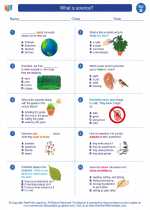Mutation
A mutation is a permanent alteration in the DNA sequence that makes up a gene. Mutations can occur for various reasons, including errors in DNA replication, exposure to mutagenic agents such as radiation or chemicals, or as a result of natural processes within the cell. Mutations can have a range of effects, from being harmless to causing genetic disorders or contributing to the development of cancer.
Types of Mutations
There are several types of mutations:
- Point Mutation: A change in a single nucleotide within a gene, which can lead to the production of a different protein.
- Insertion: Addition of one or more nucleotides into the DNA sequence, which can result in a shift in the reading frame of the gene.
- Deletion: Removal of one or more nucleotides from the DNA sequence, which can also cause a shift in the reading frame.
- Substitution: Replacement of one nucleotide with another, potentially leading to a different amino acid being incorporated into the protein.
Effects of Mutations
The consequences of mutations can vary:
- Silent Mutation: A mutation that does not result in a change to the amino acid sequence of the protein.
- Missense Mutation: A mutation that leads to the incorporation of a different amino acid into the protein, which can alter its function.
- Nonsense Mutation: A mutation that introduces a premature stop codon, leading to the production of a truncated and likely non-functional protein.
- Frameshift Mutation: Insertion or deletion of nucleotides causes a shift in the reading frame, leading to a completely different amino acid sequence.
Study Guide
Here are some key points to remember about mutations for your study:
- What is a mutation?
- What are the different types of mutations?
- How do mutations occur?
- What are the potential effects of mutations on proteins?
- What are examples of genetic disorders caused by mutations?
Understanding mutations is crucial in the field of genetics and has important implications for human health and disease.
[Mutation] Related Worksheets and Study Guides:
.◂Science Worksheets and Study Guides Second Grade. What is science?
Study Guide What is science?
What is science?  Worksheet/Answer key
Worksheet/Answer key What is science?
What is science?  Worksheet/Answer key
Worksheet/Answer key What is science?
What is science?  Worksheet/Answer key
Worksheet/Answer key What is science?
What is science?  Vocabulary/Answer key
Vocabulary/Answer key What is science?
What is science? 

 Worksheet/Answer key
Worksheet/Answer key
 Worksheet/Answer key
Worksheet/Answer key
 Worksheet/Answer key
Worksheet/Answer key
 Vocabulary/Answer key
Vocabulary/Answer key

The resources above cover the following skills:
LIFE SCIENCE
Ecosystems: Interactions, Energy, and Dynamics
Obtain information from literature and other media to illustrate that there are many different kinds of living things and that they exist in different places on land and in water (e.g., woodland, tundra, desert, rainforest, ocean, river).
EARTH AND SPACE SCIENCE
Earth’s Systems
Make observations from media to obtain information about Earth’s events that happen over a short period of time (e.g., tornados, volcanic explosions, earthquakes) or over a time period longer than one can observe (e.g., erosion of rocks, melting of glaciers).
Collect and evaluate data to identify water found on Earth and determine whether it is a solid or a liquid (e.g., glaciers as solid forms of water; oceans, lakes, rivers, streams as liquid forms of water).